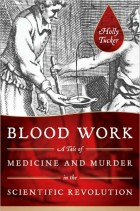W.W. Norton & Co., $25.95, 304 pages
Holly Tucker’s Blood Work explores the development of blood transfusion in European medicine in the later half of the 17th century. This brilliant book describes the circumstances surrounding the murder trial of a French physician named Jean-Baptiste Denis, and his use of a calf to transfuse blood into a (perhaps) not-so-willing human guinea pig; a homeless, and mentally unstable man named Mauroy. While this history book could have been dry and dusty, Holly Tucker is very skilled at making this seem alive and very, very interesting.
The book works as history about a particular event, but also as an exploration of medical ethics, and how “scientific progress” is measured, or even if progress can be said to occur at all. Tucker reminds us that we are not at all far removed from the superstition surrounding blood transfusion, stating that donated blood was routinely segregated by race, well into the 1970s.
Tucker also reminds us that modern medicine is equally fraught with the questions of ethics, specifically the use of human embryos in stem cell research. Tucker very successfully describes the state of scientific inquiry by competing Natural Philosophers in London and in Paris, and of medical progress in the period, two centuries before the concept of germs and anti-septic technologies. Blood Work re-introduces us to a time where modern scientific (although grossly misguided, and macabre) practices overtake the ancient concepts of bloodletting and the balance of humors. Anybody who enjoys the history of science, or medicine will deeply enjoy this book.
Reviewed by Bradley Wright

